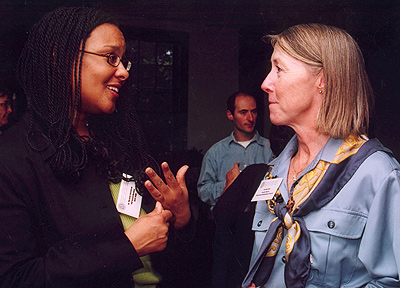Berkeleyan
 |
Caroline Kane (right) and Michele de Couteau, former director of the Multicultural Engineering Program, in an animated chat circa 2002. (Peg Skorpinski photo) |
Stepping down, but staying the course
Caroline Kane is retiring after a quarter-century of biochemical research and full-bore activism on behalf of student diversity
![]()
| 04 June 2008
It’s no great surprise, perhaps, that Caroline Kane plans to spend part of her retirement engaged in post-career activities like learning Mandarin and volunteering at the Lindsay Wildlife Museum in Walnut Creek. What is surprising — except to those who know her — is that she plans to devote half of her time to partnering with professional organizations such as the American Society for Cell Biology and Biotech Partners in an effort to broaden the participation of underserved populations in K-12 science.
During a 27-year-long stint as a researcher and professor of biochemistry and molecular biology, Kane, who retires June 27, earned international recognition in the field of gene expression, working with eukaryotic cells and focusing on the transcription-elongation process of several infectious viruses.
Being a top researcher, however, has never stood in the way of her dedication to mentoring students. In 1992 she founded the Biology Scholars Program (bsp.berkeley.edu) to promote access to research opportunities for students who lack role models and personal connections to the world of science. Since then, under her direction, BSP has graduated more than 900 women and minority scholars.
In addition, Kane has been the campus coordinator and, more recently, the UC systemwide director of UC LEADS, whose mission is to increase participation of underserved students in the sciences. She has also served as a faculty representative at the Center for Educational Partnerships (CEP) for K-12.
Gail Kaufman, campus director of school/university partnerships, began working with Kane about a decade ago as deputy director for CEP. She calls Kane “a constant and an enthusiastic partner in our outreach programs.”
“She has been a relentless champion of diversity since before it became fashionable,” says Michele de Couteau, assistant dean in the College of Engineering. “Countless students, faculty, and staff have benefited from the work of this remarkable member of the Berkeley community.”
Research with legs
Kane learned firsthand what it’s like to go into a field with no role models. Growing up in a rural town just outside of Columbus, Ohio, she was passed up for high-school dates for being a “science geek.” In the mid-1960s she was the only woman undergraduate at Ohio University taking upper-division chemistry courses; when she got to graduate school, some of her professors were more apt to comment on her legs than on the quality of her research.
The cultural climate of the ’60s, which began with the civil-rights movement, helped shape her political consciousness. She also discovered a role model in her mother, who never received a college education but was strong-willed enough to become an air-traffic controller during World War II.
“We forget that scientists are people, too,” Kane says, explaining why she has dedicated so much time and effort to increasing access for underserved students. “They bring their own life experiences, which influence their research interests and their analysis. Science has to reflect the diversity of our varied experiences.”
Rather than rely solely on the usual indicators for academic success, such as grade-point averages and Graduate Record Exam scores, Kane seeks out students she describes as “diamonds in the rough,” those who possess such qualities as “curiosity, attentiveness to detail, and tenacity.”
For their part, her students attest to her indelible personal touch, which can include inviting students to her home, throwing baby showers for them, or staying in touch long after they’ve left her lab.
“I always felt that she understood where I was coming from, without treating me as though I was the odd person out,” says Massiel Chavez, a student who worked with Kane in the summer of 2006.
Audrey Knowlton, graduate-diversity director for biological sciences, points to Kane’s habit of calling up individual students who fail to make the cut in admissions and coaching them so that they can get in next time. “She’s raised the bar for all of us to better understand the challenges and rewards of mentoring diverse students,” says Knowlton, praising what she terms Kane’s “holistic mentoring.”
Among many distinctions for her mentoring and service, Kane has received the prestigious presidential Award for Excellence from the White House and the Chancellor’s Award for Advancing Institutional Excellence.
Gloria Chun is graduate diversity director for the social sciences division of L&S.

